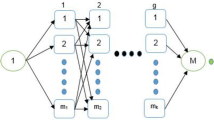Abstract
Flexible job-shop scheduling problem with worker flexibility (FJSPW) has been frequently investigated during the last decade. Many real-world industries proceed with limited multiskilled workers to optimize cost and improve efficiency, and also to overcome the occasional shortage of workers. Owing to the limited flexible workforce, an excessive workload amongst workers can cause stress, exertion, and lack of focus, leading to low productivity. However, such problems caused due to the limited number of workers are generally not investigated in depth in FJSPW. To consider workforce relief and productivity simultaneously, this research proposes the flexible job-shop scheduling problem with limited flexible workers (FJSPLFW) with the objectives to minimize the makespan, maximum worker workload and total workload of machines. An improved multiobjective discrete teaching–learning based optimization (IMDTLBO) algorithm is introduced to solve the FJSPLFW. A teaching–learning based random partial updating of the learners is proposed to enhance the diversity of learners (population) and avoid local optimum. The number of chapters (elements) of the learner to be updated is considered a key parameter and its value is evaluated with other key parameters through the Taguchi method. The IMDTLBO algorithm is tested on FJSPLFW through various experiments based on 30 newly constructed benchmark instances. The results show that the IMDTLBO algorithm is competitive in solving FJSPLFW.











Similar content being viewed by others

Data availability
The data that support the findings of this study are openly available on.
https://www.researchgate.net/publication/368691164_Appendix_A with the extraction code: c1508.
References
Ahmadi E, Zandieh M, Farrokh M, Emami SM (2016) A multi objective optimization approach for flexible job shop scheduling problem under random machine breakdown by evolutionary algorithms. Comput Oper Res 73:56–66. https://doi.org/10.1016/j.cor.2016.03.009
Bosman PAN, Thierens D (2003) The balance between proximity and diversity in multiobjective evolutionary algorithms. IEEE Trans Evol Comput 7:174–188. https://doi.org/10.1109/TEVC.2003.810761
Brucker P, Schlie R (1990) Job-shop scheduling with multi-purpose machines. Computing 45:369–375. https://doi.org/10.1007/BF02238804
Buddala R, Mahapatra SS (2019) An integrated approach for scheduling flexible job-shop using teaching–learning-based optimization method. J Ind Eng Int 15:181–192. https://doi.org/10.1007/s40092-018-0280-8
Caldeira RH, Gnanavelbabu A (2021) A Pareto based discrete Jaya algorithm for multi-objective flexible job shop scheduling problem. Expert Syst Appl 170:114567. https://doi.org/10.1016/j.eswa.2021.114567
Deb K, Pratap A, Agarwal S, Meyarivan T (2002) A fast and elitist multiobjective genetic algorithm: NSGA-II. IEEE Trans Evol Comput 6:182–197. https://doi.org/10.1109/4235.996017
Deng Q, Gong G, Gong X, Zhang L, Liu W, Ren Q (2017) A bee evolutionary guiding nondominated sorting genetic algorithm ii for multiobjective flexible job-shop scheduling. Comput Intell Neurosci 2017:1–20. https://doi.org/10.1155/2017/5232518
Fattahi P, Saidi Mehrabad M, Jolai F (2007) Mathematical modeling and heuristic approaches to flexible job shop scheduling problems. J Intell Manuf 18:331–342. https://doi.org/10.1007/s10845-007-0026-8
Felan JT, Fry TD (2001) Multi-level heterogeneous worker flexibility in a dual resource constrained (DRC) job-shop. Int J Prod Res 39:3041–3059. https://doi.org/10.1080/00207540110047702
Fry TD, Kher HV, Malhotra MK (1995) Managing worker flexibility and attrition in dual resource constrained job shops. Int J Prod Res 33:2163–2179. https://doi.org/10.1080/00207549508904809
Gao L, Pan QK (2016) A shuffled multi-swarm micro-migrating birds optimizer for a multi-resource-constrained flexible job shop scheduling problem. Inf Sci (n y) 372:655–676. https://doi.org/10.1016/j.ins.2016.08.046
Gao K, Yang F, Zhou M, Pan Q, Suganthan PN (2019) Flexible job-shop rescheduling for new job insertion by using discrete Jaya algorithm. IEEE Trans Cybern 49:1944–1955. https://doi.org/10.1109/TCYB.2018.2817240
Gnanavelbabu A, Caldeira RH, Vaidyanathan T (2021) A simulation-based modified backtracking search algorithm for multi-objective stochastic flexible job shop scheduling problem with worker flexibility. Appl Soft Comput 113:107960. https://doi.org/10.1016/j.asoc.2021.107960
Gong G, Deng Q, Gong X, Liu W, Ren Q (2018a) A new double flexible job-shop scheduling problem integrating processing time, green production, and human factor indicators. J Clean Prod. https://doi.org/10.1016/j.jclepro.2017.10.188
Gong X, Deng Q, Gong G, Liu W, Ren Q (2018b) A memetic algorithm for multi-objective flexible job-shop problem with worker flexibility. Int J Prod Res 56:2506–2522. https://doi.org/10.1080/00207543.2017.1388933
Gong G, Deng Q, Gong X, Huang D (2021) A non-dominated ensemble fitness ranking algorithm for multi-objective flexible job-shop scheduling problem considering worker flexibility and green factors. Knowl Based Syst 231:107430. https://doi.org/10.1016/j.knosys.2021.107430
Huang RH, Yu TH (2017) An effective ant colony optimization algorithm for multi-objective job-shop scheduling with equal-size lot-splitting. Appl Soft Comput 57:642–656. https://doi.org/10.1016/j.asoc.2017.04.062
Huang X, Guan Z, Yang L (2018) An effective hybrid algorithm for multi-objective flexible job-shop scheduling problem. Adv Mech Eng 10:168781401880144. https://doi.org/10.1177/1687814018801442
** L, Zhang C, Wen X, Sun C, Fei X (2021) A neutrosophic set-based TLBO algorithm for the flexible job-shop scheduling problem with routing flexibility and uncertain processing times. Compl Intell Syst 7:2833–2853. https://doi.org/10.1007/s40747-021-00461-3
Kacem I, Hammadi S, Borne P (2002a) Pareto-optimality approach for flexible job-shop scheduling problems: Hybridization of evolutionary algorithms and fuzzy logic. Math Comput Simul 60:245–276. https://doi.org/10.1016/S0378-4754(02)00019-8
Kacem I, Hammadi S, Borne P (2002b) Approach by localization and multiobjective evolutionary optimization for flexible job-shop scheduling problems. IEEE Trans Syst Man Cybern Part C Appl Rev 32:1–13. https://doi.org/10.1109/TSMCC.2002.1009117
Lei D, Gao L, Zheng Y (2018) A novel teaching-learning-based optimization algorithm for energy-efficient scheduling in hybrid flow shop. IEEE Trans Eng Manag 65:330–340. https://doi.org/10.1109/TEM.2017.2774281
Lei D, Su B, Li M (2021) Cooperated teaching-learning-based optimizations for distributed two-stage assembly flow shop scheduling. Int J Prod Res 59:7232–7245. https://doi.org/10.1080/00207543.2020.1836422
Li JQ, Pan QK, Gao KZ (2011) Pareto-based discrete artificial bee colony algorithm for multi-objective flexible job shop scheduling problems. Int J Adv Manuf Technol 55:1159–1169. https://doi.org/10.1007/s00170-010-3140-2
Li C, Cui H, Wang G (2013) The optimization of flexible job-shop scheduling problem based on NSGA-II. Adv Mater Res 651:684–687
Li JQ, Pan QK, Tasgetiren MF (2014) A discrete artificial bee colony algorithm for the multi-objective flexible job-shop scheduling problem with maintenance activities. Appl Math Model 38:1111–1132. https://doi.org/10.1016/j.apm.2013.07.038
Li J, Huang Y, Niu X (2016) A branch population genetic algorithm for dual-resource constrained job shop scheduling problem. Comput Ind Eng 102:113–131. https://doi.org/10.1016/j.cie.2016.10.012
Li JQ, Deng JW, Li CY, Han YY, Tian J, Zhang B, Wang CG (2020) An improved Jaya algorithm for solving the flexible job shop scheduling problem with transportation and setup times. Knowl Based Syst 200:106032. https://doi.org/10.1016/j.knosys.2020.106032
Li W, He L, Cao Y (2021) Many-objective evolutionary algorithm with reference point-based fuzzy correlation entropy for energy-efficient job shop scheduling with limited workers. IEEE Trans Cybern. https://doi.org/10.1109/TCYB.2021.3069184
Mahmoodjanloo M, Tavakkoli-Moghaddam R, Baboli A, Bozorgi-Amiri A (2020) Flexible job shop scheduling problem with reconfigurable machine tools: an improved differential evolution algorithm. Appl Soft Comput 94:106416. https://doi.org/10.1016/j.asoc.2020.106416
Meng T, Pan QK, Sang HY (2018) A hybrid artificial bee colony algorithm for a flexible job shop scheduling problem with overlap** in operations. Int J Prod Res 56:5278–5292. https://doi.org/10.1080/00207543.2018.1467575
Mishra A, Shrivastava D (2018) A TLBO and a Jaya heuristics for permutation flow shop scheduling to minimize the sum of inventory holding and batch delay costs. Comput Ind Eng 124:509–522. https://doi.org/10.1016/j.cie.2018.07.049
Montgomery DC (2008) Design & analysis of experiments. John Wiley and Sons, New York
Nelson RT (1967) Labor and machine limited production systems. Manage Sci 13:648–671. https://doi.org/10.1287/mnsc.13.9.648
Paksi ABN, Ma’Ruf A (2016) Flexible job-shop scheduling with dual-resource constraints to minimize tardiness using genetic algorithm. In: IOP Conference series: Materials Science and Engineering, p 012060
Rao RV, Savsani VJ, Vakharia DP (2011) Teaching-learning-based optimization: a novel method for constrained mechanical design optimization problems. CAD Comput Aided Des 43:303–315. https://doi.org/10.1016/j.cad.2010.12.015
Shao W, Pi D, Shao Z (2016) A hybrid discrete optimization algorithm based on teaching–probabilistic learning mechanism for no-wait flow shop scheduling. Knowl Based Syst 107:219–234. https://doi.org/10.1016/j.knosys.2016.06.011
Shen J, Wang L, Zheng H (2016) A modified teaching–learning-based optimizations algorithm for bi-objective re-entrant hybrid flowshop scheduling. Int J Prod Res 54:3622–3639. https://doi.org/10.1080/00207543.2015.1120900
Sun J, Zhang G, Lu J, Zhang W (2021) A hybrid many-objective evolutionary algorithm for flexible job-shop scheduling problem with transportation and setup times. Comput Oper Res 132:105263. https://doi.org/10.1016/j.cor.2021.105263
Wu R, Li Y, Guo S, Xu W (2018) Solving the dual-resource constrained flexible job shop scheduling problem with learning effect by a hybrid genetic algorithm. Adv Mech Eng 10:168781401880409. https://doi.org/10.1177/1687814018804096
Wu X, Peng J, **ao X, Wu S (2021) An effective approach for the dual-resource flexible job shop scheduling problem considering loading and unloading. J Intell Manuf 32:707–728. https://doi.org/10.1007/s10845-020-01697-5
**a W, Wu Z (2005) An effective hybrid optimization approach for multi-objective flexible job-shop scheduling problems. Comput Ind Eng 48:409–425. https://doi.org/10.1016/j.cie.2005.01.018
**e Z, Zhang C, Shao X, Lin W, Zhu H (2014) An effective hybrid teaching-learning-based optimization algorithm for permutation flow shop scheduling problem. Adv Eng Soft. https://doi.org/10.1016/j.advengsoft.2014.07.006
**e F, Li L, Li L et al (2023) A decomposition-based multi-objective Jaya algorithm for lot-streaming job shop scheduling with variable sublots and intermingling setting. Expert Syst Appl 228:120402. https://doi.org/10.1016/j.eswa.2023.120402
Xu Y, Wang L, Wang SY, Liu M (2015) An effective teaching-learning-based optimization algorithm for the flexible job-shop scheduling problem with fuzzy processing time. Neurocomputing 148:260–268. https://doi.org/10.1016/j.neucom.2013.10.042
Yuan Y, Xu H (2015) Multiobjective flexible job shop scheduling using memetic algorithms. IEEE Trans Autom Sci Eng 12:336–353. https://doi.org/10.1109/TASE.2013.2274517
Yue H, Slomp J, Molleman E, Van Der Zee DJ (2008) Worker flexibility in a parallel dual resource constrained job shop. Int J Prod Res 46:451–467. https://doi.org/10.1080/00207540601138510
Zhang J, Wang W, Xu X (2017) A hybrid discrete particle swarm optimization for dual-resource constrained job shop scheduling with resource flexibility. J Intell Manuf 28:1961–1972. https://doi.org/10.1007/s10845-015-1082-0
Zhang F, Mei Y, Nguyen S, Zhang M (2022) Multitask multiobjective genetic programming for automated scheduling heuristic learning in dynamic flexible job-shop scheduling. IEEE Trans Cybern. https://doi.org/10.1109/TCYB.2022.3196887
Zheng XL, Wang L (2016) A knowledge-guided fruit fly optimization algorithm for dual resource constrained flexible job-shop scheduling problem. Int J Prod Res 54:5554–5566. https://doi.org/10.1080/00207543.2016.1170226
Zhong Q, Yang H (2018) Optimization algorithm simulation for dual-resource constrained job-shop scheduling. Int J Simul Model 17:147–158. https://doi.org/10.2507/IJSIMM17(1)CO2
Zhu H, Deng Q, Zhang L et al (2020) Low carbon flexible job shop scheduling problem considering worker learning using a memetic algorithm. Optim Eng 21:1691–1716. https://doi.org/10.1007/s11081-020-09494-y
Zitzler E, Thiele L (1999) Multiobjective evolutionary algorithms: a comparative case study and the strength Pareto approach. IEEE Trans Evol Comput 3:257–271. https://doi.org/10.1109/4235.797969
Funding
This research received no specific grant from any funding agency.
Author information
Authors and Affiliations
Corresponding author
Ethics declarations
Conflict of interest
No potential conflict of interest was reported by the author(s).
Additional information
Publisher's Note
Springer Nature remains neutral with regard to jurisdictional claims in published maps and institutional affiliations.
Rights and permissions
Springer Nature or its licensor (e.g. a society or other partner) holds exclusive rights to this article under a publishing agreement with the author(s) or other rightsholder(s); author self-archiving of the accepted manuscript version of this article is solely governed by the terms of such publishing agreement and applicable law.
About this article
Cite this article
Usman, S., Lu, C. & Gao, G. Flexible job-shop scheduling with limited flexible workers using an improved multiobjective discrete teaching–learning based optimization algorithm. Optim Eng (2023). https://doi.org/10.1007/s11081-023-09842-8
Received:
Revised:
Accepted:
Published:
DOI: https://doi.org/10.1007/s11081-023-09842-8



